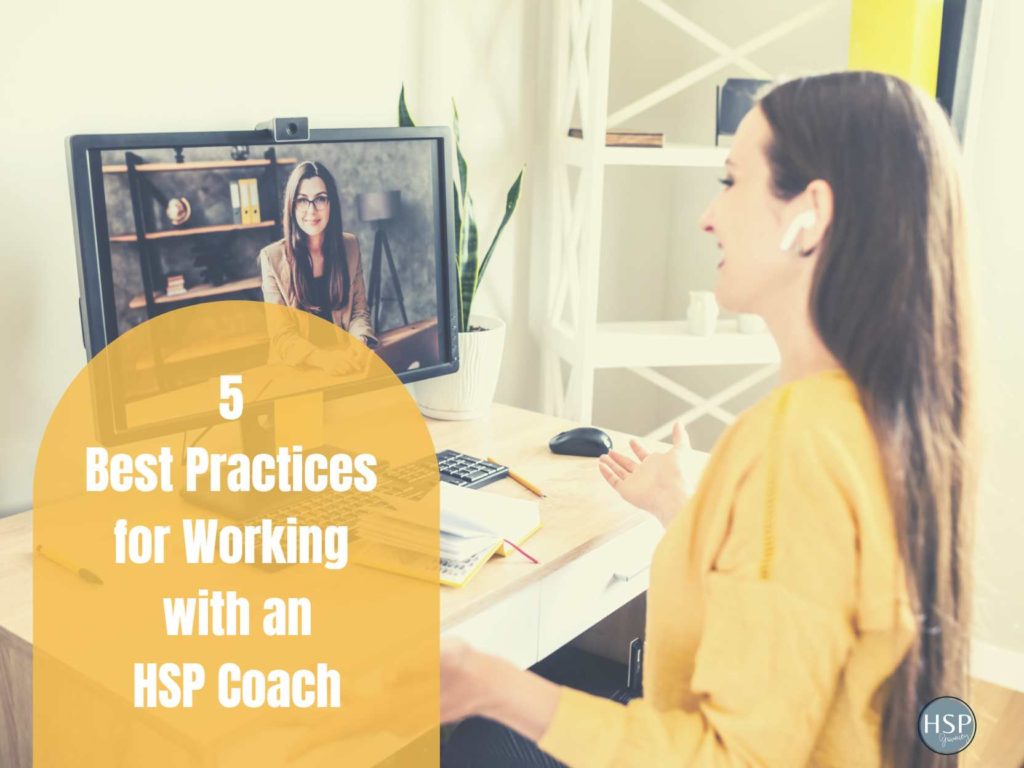Deciding to work with a life coach who understands and has done training around the Highly Sensitive Person trait is a great way to honor your identity and find someone who can truly help you. An HSP coach can offer a nuanced approach to listening and understanding your needs and can push you in just the right areas for growth. In this article, I’ll share five best practices for working with an HSP coach that will help you on your way.

Table of Contents
Best Practice #1 – Give Permission to Your HSP Coach to Work with You
This might sound silly or redundant, but giving your HSP coach permission to work with you is invaluable. For those who have been hurt by close relations or have had anxiety around being vulnerable with someone about their sensitivity, it could mean the difference between success and failure.
In the Nickerson Institute’s HSP Certification Course, they advise therapists and coaches to invite their clients to write a statement of intention to read aloud before each session. This intentionality can remind you that you are opening yourself up to a coach to allow for growth and help. You could also verbally tell your coach that you give them permission to work with you. Lastly, you can do something physical such as move a pillow from your lap to the couch or hold your hands out wide while giving your permission to show that you are physically open to the changes that can be made during coaching. These simple steps are a gateway to growth in working with your HSP coach.

Become an HSP-Trained Coach with certification from the Nickerson Institute. This course is for professionals working with Highly Sensitive People. It covers various assessments, mistaken conditions, health-related issues, and challenges with identity, relationships, boundaries, as well as traditional/alternative therapies.
Best Practice #2 – Be Vulnerable with Your HSP Coach
In order to make the most of coaching, you’ll want to plan to have an attitude of openness and vulnerability. If you’ve sought out coaching, chances are you have a growth mindset and are interested in personal development. Your HSP coach will be certified in understanding the Highly Sensitive Person trait and bring a depth of understanding into your coaching relationship that will be nourishing and transformational. There’s something incredibly special about bringing a trusted coach into your personal growth process. There is flexibility in coaching and the relationship can include mentoring, accountability, spiritual direction, habits, and much more. Being vulnerable and coachable is the first step.
Best Practice #3 – Be Responsive to your HSP Coach when they make suggestions
It can be hard to take advice. You know the old adage, feedback not asked for comes across as criticism. If you’re paying good money for an HSP coach, you’ll want to be responsible when your coach makes suggestions or provides feedback. In my coaching sessions, I make a concerted effort not to tell a client what to do. If you wanted to be told what to do, you would have asked a relative or close friend (sarcasm intended). The beauty of a coaching relationship is that we act as a guide to help you navigate the things going on in your life.
My role as a coach is not to tell someone what to do, but to ask the right questions for clients to come about an answer to their questions based on the needs and concerns they share regarding the struggle. When you come to a conclusion about something your coach has helped you reach, take note and take it to heart. Implement the change or the decision to find healing and growth.
Recommended Reading:
Best Practice #4 – Be willing to see things from a different perspective
Another beautiful thing that my clients experience is in seeing something from a different perspective. Perhaps you’re struggling with a partner or a child, or you had a fallout with a close friend. Through processing your situations with an HSP coach, you can have a bird’s eye view into another person’s point of view. You can better understand others and yourself through your coaching relationship. Learning to see things from a different angle can make all the difference in achieving your goals.

Best Practice #5 – Take Time to Reflect and Consider What You’re Learning About Yourself
Lastly, it’s important to give yourself adequate time before and after each session with your HSP coach to process what you want to talk about and what you learned during your session. Most coaches keep notes on their clients and some will send you a recap email with the things you discussed, or things you’re hoping to work on. Some clients enjoy having homework such as a book to read or a self-inventory to take. The good news is that coaching relationships are flexible and can cover a wide range of needs, topics, and interests. When a coach recognizes their Highly Sensitive Person trait and takes certification such as the Nickerson Institute HSP Certification Course, working with HSPs can become a rewarding and mutually beneficial relationship.

Looking for an HSP-Trained coach to help you align your life with your priorities?
Through my Highly Sensitive Person (HSP) certification with the Nickerson Institute, as well as being an HSP, I offer HSP coaching to develop specific goals around your HSP needs. We HSPs frequently deal with anxiety and overstimulated nervous systems that prevent us from achieving peace and attaining our life goals. HSP coaching with me includes a detailed review of your sensitivities and a mutually-desired plan for growth and management of this superpower to shift negativity and begin seeing yourself as the hero of your own story. (Affordable monthly coaching begins at $150/month.)
Be sensitive, be free
*This post contains affiliate links and I will be compensated if you make a purchase after clicking on my links*





[…] 5 Best Practices for Working with an HSP Coach […]